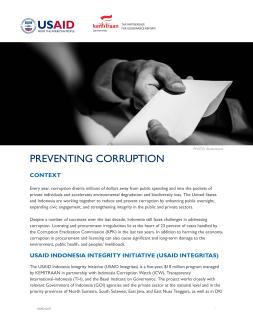Context
Every year, corruption diverts millions of dollars away from public spending and into the pockets of private individuals and accelerates environmental degradation and biodiversity loss. The United States and Indonesia are working together to reduce and prevent corruption by enhancing public oversight, expanding civic engagement, and strengthening integrity in the public and private sectors.
Despite a number of successes over the last decade, Indonesia still faces challenges in addressing
corruption. Licensing and procurement irregularities lie at the heart of 23 percent of cases handled by the Corruption Eradication Commission (KPK) in the last ten years. In addition to harming the economy, corruption in procurement and licensing can also cause significant and long-term damage to the environment, public health, and peoples' livelihoods.
USAID Indonesia Integrity Initiative (USAID Integritas)
The USAID Indonesia Integrity Initiative (USAID Integritas) is a five-year, $10 million program managed by KEMITRAAN in partnership with Indonesia Corruption Watch (ICW), Transparency International-Indonesia (TI-I), and the Basel Institute on Governance. The project works closely with relevant Government of Indonesia (GOI) agencies and the private sector at the national level and in the priority provinces of North Sumatra, South Sulawesi, East Java, and East Nusa Tenggara, as well as in DKI Jakarta.
USAID Integritas focuses on identifying, preventing, and managing conflicts of interest (COIs) in licensing and procurement related to natural resources. The activity enhances policies and practices that reduce COIs by strengthening prevention mechanisms, enhancing public and private sector engagement, and boosting transparency through more open political and campaign finance information. It also aims to improve public education, awareness, and participation by strengthening avenues and mechanisms for public oversight and enhancing public engagement in anti-corruption efforts
Results
In its first year, USAID Integritas has:
Completed an assessment that identified gaps between international frameworks on managing COIs and existing policies in Indonesia, as well as gaps between COI policy and implementation at the national and provincial levels;
Conducted case studies on COIs in procurement and environment-related legislation, public officials’ positions on the boards of state-owned enterprises, and sexual exploitation in corruption cases;
Prepared nine anti-corruption measures in the areas of fishery management, state-owned enterprises, law enforcement, and political finance transparency, among others, that were adopted in the 2023-2024 National Action Plan on Corruption Prevention;
Launched a report on Transparency in Corporate Reporting (TRAC), which assessed 47 local government-owned enterprises and identified significant weaknesses in anti-corruption commitment and the inclusion of politically-exposed persons in corporate boards;
Produced a policy paper on political party finance to inform financial reporting standards;
Established a relationship with regional Higher Education Service Institutes—whose members include hundreds of institutions and thousands of instructors—to encourage adoption of the Anti-Corruption Academy curriculum at universities;
Trained more than 2,000 students and CSO personnel on anti-corruption through the Anti-Corruption Academy; and
Promoted OpenTender.net, a public oversight platform on public procurement, via social media to youth, government officials, journalists, and civil society organizations.
Contact
Ahmad Qisa’i, USAID at aqisai@usaid.gov
Justin Snyder, USAID Integritas – KEMITRAAN at justin.snyder@kemitraan.or.id


